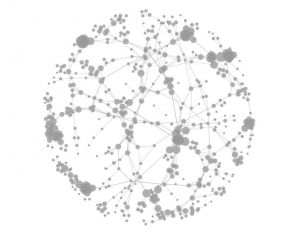Este trabajo, que se publica hoy en la revista Nature Communications, ha sido dirigido por Jacobo Aguirre, investigador del Centro Nacional de Biotecnología (CNB-CSIC), que explica cómo “Los análisis fuera del equilibrio en la naturaleza son en general difíciles de obtener, por eso la mayor parte de los estudios se centran en procesos en equilibrio. Nosotros hemos sido capaces de crear un marco de trabajo novedoso para analizar y controlar procesos evolutivos que puedan ocurrir sobre redes de redes, es decir, redes interconectadas por pocas interconexiones, en tiempo real, sin necesidad de esperar a que el sistema llegue a un equilibrio.”
Aguirre continúa: “La clave es que al condensar toda la dinámica del sistema en una sola ecuación y una proyección 2D podemos saber cuánta información, dinero o población se mueve de una red a otra en cada momento en función de cómo estén conectadas, y controlar absolutamente la evolución de dicho sistema, cambiando las conexiones a nuestro gusto para acelerar el proceso, retrasarlo, cambiar el sentido de movimiento, etc.”
Evolución de la red económica de los países miembros de la OCDE
Las novedades de este enfoque son su carácter predictivo y su generalidad, ya que permite controlar el futuro de multitud de sistemas de muy diversa índole, tanto en el ámbito de las ciencias de la vida como en problemas relacionados con redes sociales, tecnológicas o económicas.
“Esta nueva metodología para analizar la interacción entre redes fuera del equilibrio tiene infinidad de aplicaciones prácticas, y podría ayudar a comprender procesos globales como la propagación de epidemias en grupos sociales o de biodiversidad en hábitats fragmentados, la aparición de nuevas tecnologías, o las interacciones económicas entre empresas o países”, afirma Javier M. Buldú, coordinador del Grupo de Sistemas Complejos de la Universidad Rey Juan Carlos y uno de los autores de este trabajo. Como ejemplo, los investigadores han utilizado información sobre las relaciones económicas entre los países miembros de la OCDE durante 10 años (de 2005 hasta 2015). Estos datos muestran cuáles son las conexiones entre los diferentes sectores económicos de los 36 países de la organización y han analizado cómo han evolucionado 3 de ellos (Japón, Islandia y España) en respuesta a una situación muy concreta: la crisis de 2008. Este enfoque innovador les ha permitido analizar la diferente estrategia seguidas por cada uno de ellos, demostrando ser una herramienta con gran potencial para poder aportar información relevante a la hora de optimizar el comportamiento económico de los diferentes países ante los muchos retos que nos ofrece un mundo cada vez más cambiante e impredecible.
Referencia: Taming out-of-equilibrium dynamics on interconnected networks. Javier M. Buldú Federico Pablo-Martí and Jacobo Aguirre. Nature Communications 2019. DOI: 10.1038/s41467-019-13291-2






